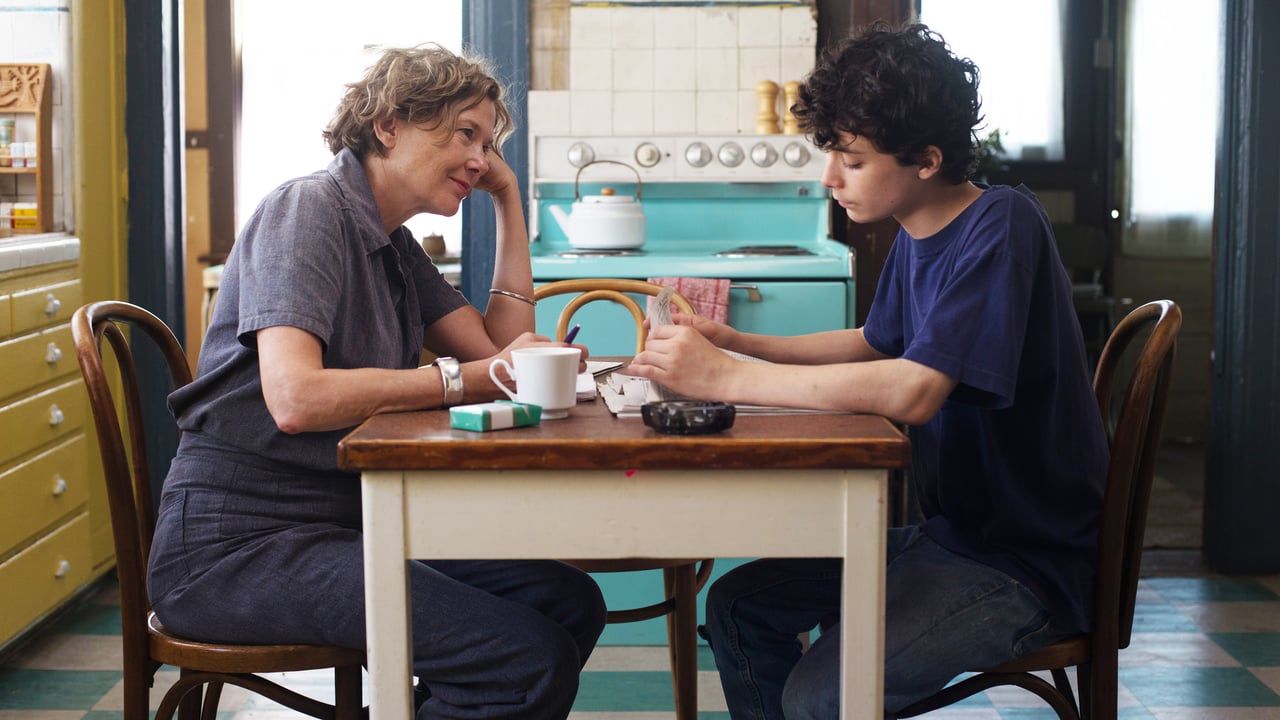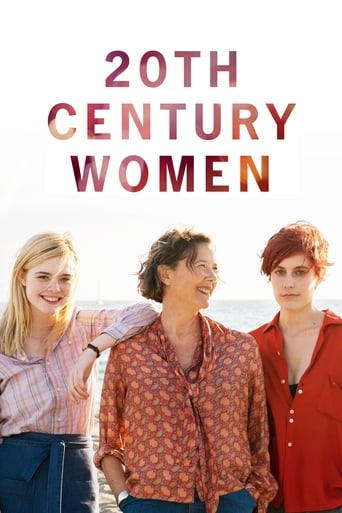

My wife commented half-way through, "This movie should just be called 'The Bechdel Test.'" And it IS a fascinating look at conversations about identity and gender at a particular moment in time in US history. That said, it felt like Mills was counting on setting, performances, and thematic richness to bail out a story lacking in plot. Did they? Yeah...a little. But a little more story and a little less white liberal nostalgia would have been nice.
... View MoreThe greatest thing about "20th Century Women" is the cinematography. The backstories, glimpses of the future, and story progression is sometimes told in a series of poignant short vignettes graced by self- narration from the individual characters of the film. This technique seemingly allows you to peer through the changes in characters over long periods of time without being burdened by the minor details. It is a beautiful film that is well executed. "20th Century Women" is a 2016 film that offers a commentary on the baby boomers who grew up in the 1970s in Southern California, some of whom would go on to be responsible for the largest creation of wealth in history.The year at the opening of the film is 1979. The setting is Santa Barbara, California, perhaps one of the most picturesque beach towns on the west coast. Jamie is a 15 year old teenager who grows up in this liberal city; however, he is raised by a divorced single-mother who goes by the dated name of Dorothea. As Jamie narrates to the audience, Dorothea was older than most women when she had Jamie. She was from the Depression era. As a "20th Century" woman, Dorothea insisted that Jamie was raised by the "community". One member of this community is a girl named Abbie. Dorothea runs a boarding house where the free-spirited Abbie is a tenant. Abbie is an aspiring photographer who has a strained relationship with her own mother for turning her into a "DES daughter". DES was a fertility drug that many women used that was later discovered to cause cancer. Abbie learns that despite surviving the cancer that her mother's use of fertility drugs gave her, she will never be able to have children. As this drama progresses, Abbie takes refuge in Dorothea and Jamie. She also helps Jamie navigate his first teenage crush who happens to be his best friend, Julie. Julie also chooses to take on the role of being a part of the community who raises Jamie. When Jamie learns that his mother went to Julie and Abbie for advice on how to raise him, he begins a rebellious streak. Like so many other teenagers of his era, he runs away from home to attend a rock concert. Abbie and Jamie form a brother-sister like relationship. But Julie and Jamie never end up together romantically. This forms one of the major conflicts in the story. Dorothea has her own relationship problems. At its core, Dorothea represents women who pursue the "safe choice" in relationships instead of pursuing the people they are attracted to. Julie, on the other hand, pursues only the men she is attracted to and feels that a physical attraction is different from an emotional attraction. Jamie eventually confides in Julie that he loves her. But Julie says she cares too much about him as a friend to have sex. Julie is a witness to the women's liberation movement. She even participates. During one scene, she tells the story of her first sexual encounter using "spit" as a lubricant during a deeply awkward and inappropriate dinner conversation with Jamie and Dorothea. Julie and Jamie eventually grow apart. But Dorothea eventually benefits from the same movement and finds the courage to approach William, the man she is attracted to. At the beginning of the film, he is promiscuous and narrates aloud, "Women didn't have to look one way or another or be a certain way. I think that I just, I want to win them over so that I won't be lonely. But once I have them, I don't really know what to do with them". Dorothea changes that. The story of "20th Century Women" culminates with Dorothea finally accepting the generational gap between her and her son. She can never truly connect with Jamie the way she wants to. The community can no longer raise people's children. But that doesn't mean Jamie and Dorothea don't have a good relationship. The film could have been better if it weren't for the abrupt ending. After building the relationships of the characters so well, the film ends with the main characters describing the rest of their own lives using voice-overs. To a 21st century baby, how does one explain the charisma of a "20th Century Woman" like Dorothea? Future women will be more like Julie and will benefit from the sexual liberation movement that the baby boomers advanced. In one touching scene, Julie confidently discusses her own sexuality to Jamie by explaining her attraction to men, "Their bodies cause you don't exactly know what they are going to look like or smell or feel like until you do it. But yeah, half the time I regret it" she says candidly. "Then why do you it?" Jamie inquires. "Because half the time I don't regret it,".
... View MoreMike Mills has done a pretty good life drama here as this work "20TH Century Women" is one interesting journey of life, love and how it's a tough journey of gender and culture issues as the time passes. Set in 1979 in Santa Barbara, California Dorothea Fields(Annette Bening)is a single mother who's tough and old school and she wants some help and wants to try some different methods in raising her only child a son named Jamie in what's a free spirited time.So enter her best female friends two young ladies named Abbie(Greta Gerwig)a punk rock artist type who boards in the Fields home, then next door neighbor the sexy Julie(Elle Fanning)who's a provocative sexy colored bra wearing girl who likes to explore sex and wonder about love. So will this be the answer? A makeshift family is all of a sudden formed and yes the drama and struggles of everyday life is present and common.Thru it all love, and lessons of life are learned and this film is a good showcase of gender connection and learning how to cope with culture as it affects society and as the time passes leaves it's mark on everyone. Overall good touching film to watch it just feels like so much togetherness.
... View MoreWriter and director Mike Mills film follows the lives of five people living in a house in southern California in 1979 and three generation of women.Dorothea (Annette Bening) a divorced woman in her mid 50s is raising her teenage son Jamie (Lucas Jade Zumann) and concerned to raise him properly especially as he has no male role models. Jamie is making his own way through life as a growing teenager, he has a close relationship with neighbour Julie (Elle Fanning) who sneaks into his bedroom often but she might be pregnant from a casual encounter with another teenager.Also living in the house is orange haired punk Abbie (Greta Gerwig), a young photographer and cancer survivor and hippy William (Billy Crudup) a kind of handyman and who makes things with his hands. He begins a relationship with Abbie but he is a popular guy with the ladies.The film follows how these oddball group of characters have an impact on the lives of Dorothea and Jamie as times are changing. Even President Carter is uncertain about the times. America is moving on to a new decade and indeed soon to a new president. With these changing times the characters are concerned what music and dance are considered cool or not.This is a well acted ensemble piece with the just right amount of kookiness. Look out for the awkward discussion about periods during a dinner party scene.The narrative moves ahead of time as the adult Jamie reflects back as to what happened to some of the characters, all that smoking Dorothea does will have an impact on her health some years for now.The film is rather uneven and I felt oddly paced, the running time is too long and there is little plot in it.
... View More